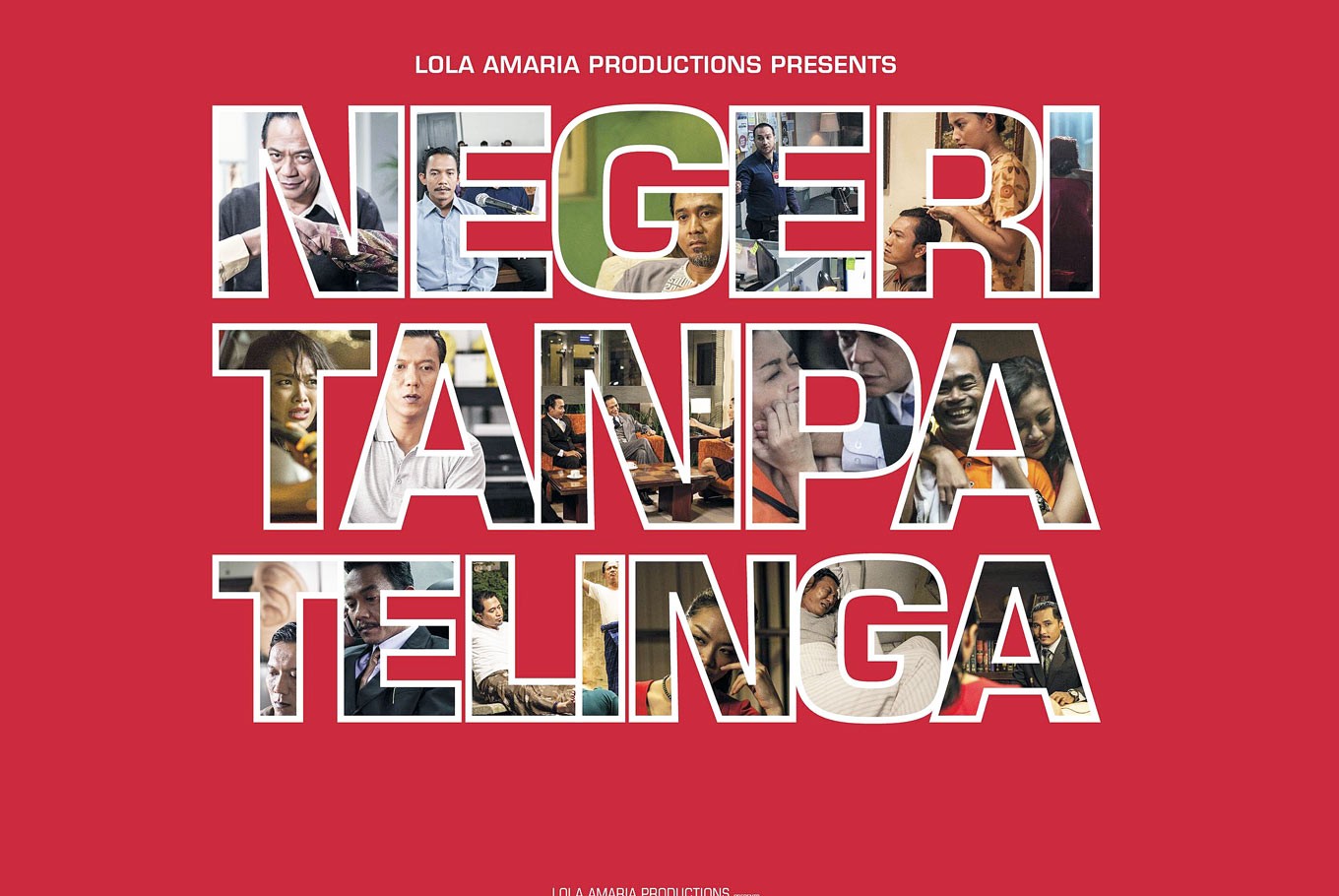Popular Reads
Top Results
Can't find what you're looking for?
View all search resultsPopular Reads
Top Results
Can't find what you're looking for?
View all search resultsIndonesia's battle against corruption on the big screen
As a reflection of the nation’s political landscape, local cinema has also naturally taken on corruption as a relevant topic.
Change text size
Gift Premium Articles
to Anyone
I
n the reform era, corruption eradication has become one of the nation’s main political preoccupations, and also one of its most vexatious problems.
As a reflection of the nation’s political landscape, local cinema has also naturally taken on corruption as a relevant topic.
Although not as common as shlock-horror flicks or rom-coms about the struggles of singledom in one’s late 20s, several notable local films with corruption as their central theme have been released in the post-1998 period.
One of the top entries in the Indonesian corruption-film catalogue is Negeri Tanpa Telinga (Nation without Ears, 2014), which follows the story of a meek masseur (Teuku Rifnu Wikana) to Jakarta’s elite who becomes privy to the corrupt machinations of national politics after overhearing conversations during sessions with his A-list clientele. After unwittingly passing on incriminating information between them, he increasingly finds himself in over his head in the murky waters of high-level political power play.
In contrast to the movie’s political players, who are only united by their obeisance to the Machiavellian operating principle of semuanya bisa diatur(everything can be arranged), Naga, driving his beat-up Vespa around Jakarta, is a stand-in for the millions of victims of the entrepreneurial nature of Indonesian politics. As the film’s title suggests, he represents all of those who are forced to “turn a deaf ear to” the vast web of corruption around them and bear the stifling feeling of living in a system in which to rock the boat can often mean being thrown overboard.
In making Negeri Tanpa Telinga, the filmmakers seemingly took direct notes from the lines of local papers. The corruption case at the center of the film bears significant similarities to an actual meat import corruption scandal that broke in early 2011 and later led to the imprisonment of the then Prosperous Justice Party (PKS) chairman and the president director of a meat importing company.
Teuku Rifnu Wikana also stars in Sebelum Pagi Terulang Kembali (Before the Morning After, 2014) as Firman, a let-down of an eldest son, who returns to live at his family home, unemployed and despondent, after his wife leaves him. However, Firman is only one part of the puzzle in this parable of family values versus unrestrained career ambitions.
The film largely focuses on middle-child Satria, a contractor with big dreams, who must choose whether to play the game of business slow, steady and clean or fast, dirty and without moral hang-ups. A difficult choice, especially because his high-flying clique is constantly telling him the latter is the only path to success. Meanwhile, Yan, the family’s upright civil servant father, must decide whether he owes a larger allegiance to his son or to the higher ideals of his profession.
Sebelum Pagi Terulang Kembali was the second production funded and produced by think tank and advocacy organization Transparency International Indonesia. Before it came the short-film anthology Kita versus Korupsi (Us vs Corruption, 2012), which over four short films depicts the various ways corruption can permeate into every corner of a society.
Aku Padamu (I Am the One for You) (images.viddsee.com/File)To mention just two of them: Aku Padamu (I’m the One for You) tells of two young lovebirds who elope on a sunny day, albeit without the documents required to navigate the bureaucratic labyrinth of officially getting hitched in Indonesia. Of course, at the Religious Affairs Office for a small fee an orang dalam (inside broker) can untangle the twisted thread required to tie the knot. Their predicament: is such a payment merely an innocuous transgression in the name of love or one of the myriad little sins from which all bigger sins grow?
Psssttt... Jangan Bilang Siapa-Siapa (Psssttt… Don’t Tell Anyone) is a mock home video featuring two hilariously sassy schoolgirls as they ponder the morality of being crooked schoolyard entrepreneurs. At first, they don’t see anything wrong with taking a little underhand profit here and there, and why would they, all the adults around them are doing just that.
Moving forward to 2015 and Joko Anwar’s most recent full-length film, A Copy of My Mind, which centers on two lovers who become unwittingly entangled in the dark underworld of transactional politics. Alek (played by Chicco Jerikho) earns his bread by producing C-grade subtitles for pirated DVDs. Sari (Tara Basro) is a beautician by day who spends her nights escaping the frustration of her job through watching these discount DVDs.
However, Sari’s cinephile tendencies lead her into the wolf’s lair after she “borrows” a DVD of what she thinks is a schlocky monster flick from one of her salon’s A-list clients, Bu Mirna, a convicted political powerbroker who receives in-cell beauty services at a women’s prison. The DVD turns out to contain video recordings of private conversations that implicate several politicians in graft and Sari and Alek find themselves in the crosshairs of BuMirna’s nefarious minions.
The four aforementioned films are not an exhaustive list of Indonesian cinema’s exploration of corruption. Other corruption-themed feature films include Pacarku Anak Koruptor (My Boyfriend is a Corruptor’s Son) and Talak 3 (the final divorce process in Islam) and the short films Kita vs Koruptor (Us vs Corruptor), Segelas Kopi Manis (A Cup of Sweet Coffee) and Sekolah Kami, Hidup Kami (Our School, Our Life).
The nation’s struggle to eradicate corruption shows that it is a battle that needs to be fought on many fronts, and these films, to the extent that they can be seen as cinematic parables about the personal moral failings of corruption, are undoubtedly a valuable part of this struggle.












